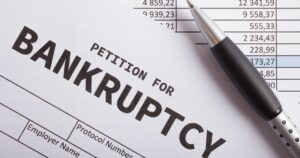Wage garnishment is a legal procedure in which a court order requires an employer to hold back a person’s earnings for the payment of a debt. If your wages are being garnished, do not assume you are completely powerless. You can alleviate or even eliminate this financial burden with the assistance of the correct bankruptcy practice.
Let’s take a look at the reasons why wage garnishment occurs and whether bankruptcy is a viable option.
Why Are Your Wages Being Garnished?
Wage garnishment occurs for several reasons. In some cases, creditors such as credit card companies or student loan issuers request a debtor’s wages be garnished. In other cases, wages are garnished to pay unpaid child support. Though it might seem unfair, the truth is creditors can deduct money from debtor paychecks after obtaining approval to do so in a court of law. The Internal Revenue Service (IRS) can also garnish your wages for failing to pay taxes.
Was Your Wage Garnishment a Surprise?
Creditors cannot garnish your entire paycheck. There are specific limits on wage garnishment. The type of debt determines the maximum level of garnishment.
For example, failing to pay taxes can lead to a 15 percent of your wages being garnishment. Failing to pay federal student loans can also lead to a 15-percent wage garnishment. If you owe child support or alimony, you could face garnishment of 50 percent of your wages. In terms of consumer debts such as personal loans, medical bills, and credit card debts, garnishment tops out at 25 percent or 30 times the federal minimum wage.
If you were not notified of the court hearings, wage garnishment might catch you by surprise. Before your wages can be garnished, a creditor must sue you for allegedly failing to pay the debt. This legal action triggers the scheduling of a court hearing. However, there is a chance that the creditor did not make you aware of the lawsuit or the hearing. You deserve the opportunity to raise a legal defense against the lawsuit and the subsequent wage garnishment. The only exception is in the context of debts for taxes, child support, and some student loans.
If you notice your weekly paycheck is less than it should be, take a close look at the deductions in the “miscellaneous” or “other” categories. Wage garnishment deductions usually appear in these sections of paychecks. Employers are legally required to provide a copy of the paperwork pertaining to the wage garnishment to an employee whose wages are being garnished. If you do not receive this paperwork, reach out to the payroll department at your employer for more information. It is quite possible your employer’s payroll department is processing the wage garnishment without making you aware of the garnishment. You need and deserve paperwork that explains the specific financial details of the wage garnishment.
Unexpected wage garnishment should also motivate you to take a look at prior correspondence with all creditors. There is a chance of a paperwork error or other oversight. Take a look at all of the paperwork sent to you by creditors in recent months and years. There might be a reference to wage garnishment in this correspondence.
It is also in your interest to request a credit report right away. Request credit reports from each of the three credit reporting agencies, review the details of your personal credit and take action to correct all inaccuracies. Correcting even a single inaccuracy in your credit report has the potential to halt the wage garnishment as soon as your next paycheck.
If you are still unsure as to why garnishment is occurring, reach out to the Internal Revenue Service (IRS) to determine if garnishment is occurring as a result of the failure to fulfill a tax obligation. If the IRS is garnishing your wages, you have every right to request a formal wage garnishment notice that details the specifics of the garnishment.
Bankruptcy After Wage Garnishment
Meet with a bankruptcy attorney to review your unique financial situation. If you move forward with filing bankruptcy, the process includes providing notice to the creditors’ attorney to cease wage garnishment. This notice is known as an automatic stay.
Once bankruptcy ceases wage garnishment, your attorney will help you pinpoint the optimal approach for debt relief. The purpose of debt relief is to prevent additional garnishment down the line. However, the longer you delay filing bankruptcy, the more income you will lose. Be decisive, act promptly, and filing bankruptcy might eliminate this financial burden from your life, providing invaluable peace of mind and financial freedom.
An Automatic Stay has the Potential to be Your Financial Lifeline
Once an automatic stay is in place, creditors will no longer be able to seek additional wage garnishments. The U.S. Bankruptcy Code stops collections agencies, creditors, and also the government from pursuing the debts you owe as your bankruptcy case progresses. The automatic stay provides a window of opportunity and also ensures the entirety of your wages remain in your bank account. A trustee overseeing your bankruptcy filing will review the petition for bankruptcy as well as your income, assets, and financial obligations.
The automatic stay begins as soon as you file for bankruptcy, regardless of the specific type of bankruptcy you file for. The bankruptcy court or your attorney contacts the creditors, stating there is an automatic stay and all collections activity and wage garnishments are to end. If collections continue, the creditor must halt all collection activity. However, if the creditor continues to proceed with collections or wage garnishment, that institution might be in contempt of bankruptcy court.
The only exception to the automatic stay is a debt that is considered a high priority. High-priority debts are not dischargeable. Examples of high-priority debts include alimony to an ex-spouse and child support. Though creditors can request that wage garnishments continue, they must prove there is sufficient cause for additional garnishment. If the debt is unsecured, it will be difficult for the creditor to prove there is good reason to continue garnishing a debtor’s hard-earned wages.
Bankruptcy is a Viable Option for Wage Garnishment
In summary, filing for bankruptcy is a sound legal strategy against wage garnishment. An automatic stay remains in place until there is a bankruptcy discharge or the court dismisses the case due to lack of qualification.
If debt discharge occurs through Chapter 7 bankruptcy, the creditor will not be able to move forward with additional wage garnishment. However, if there is no discharge, there is the potential for additional wage garnishment. File for a Chapter 13 bankruptcy and the ensuing repayment plan will address the unpaid debt unless it is applicable to a student loan.
What matters most is that you are proactive after wage garnishment begins. The most important action you can take after wage garnishment is scheduling an initial consultation with a bankruptcy attorney. This consultation provides an opportunity to consider the merits of all available legal strategies. Review all of your options in-depth with the guidance of a bankruptcy attorney and you will have the information necessary to make an informed decision.

